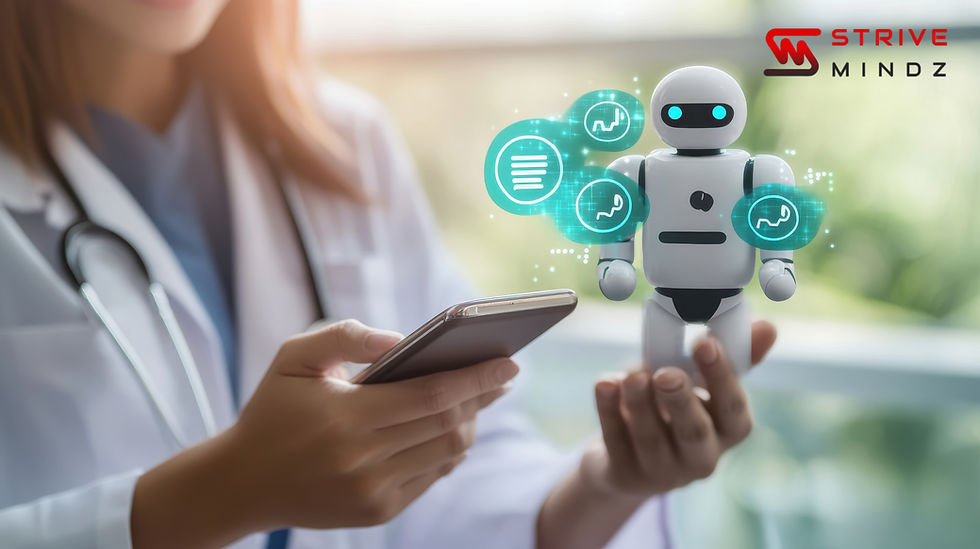How Artificial Intelligence is Transforming Healthcare in 2025 and Beyond
- Strivemindz Pvt. Ltd.

- Jun 4, 2025
- 3 min read
Artificial Intelligence (AI) is revolutionizing the healthcare industry, offering innovative solutions that enhance patient care, streamline operations, and reduce costs. AI in Healthcare Solutions - from diagnostics to personalized treatment plans, AI's integration into healthcare systems is creating a more efficient and effective medical industry.
AI's Growing Role in Healthcare
1. AI in Diagnostics: Enhancing Accuracy and Speed
AI-powered diagnostic tools are significantly improving the accuracy and speed of disease detection. In medical imaging, AI algorithms analyze X-rays, MRIs, and CT scans to identify abnormalities with remarkable precision.
Real-world impact:
AI improves diagnosis accuracy by over 90% in some use cases.
It reduces the chances of human error in reading scans.
Early detection can lead to faster recovery and lower treatment costs.
2. Personalized Medicine: Tailoring Treatments to Individuals
AI enables the development of personalized treatment plans by analyzing a patient's genetic makeup, lifestyle, and environmental factors. In oncology, AI can predict which patients are more likely to respond to specific therapies based on genetic mutations or biomarkers, leading to more effective and targeted treatments.
How it helps:
Reduces the risk of side effects
Improves treatment effectiveness
Supports precision medicine in complex cases like cancer or rare diseases
3. Virtual Health Assistants: Improving Patient Engagement
AI-driven virtual health assistants and chatbots are transforming patient interactions by providing 24/7 support, personalized guidance, and instant access to medical information. These digital assistants handle routine inquiries, appointment scheduling, and medication reminders, enhancing patient engagement and reducing the workload on healthcare professionals.
Benefits:
Reduces the burden on hospitals
Improves patient satisfaction
Provides instant responses in emergencies

4. AI for Hospital Operations and Resource Management
AI-powered wearable devices and mobile health applications allow for continuous monitoring of patients' vital signs and health metrics in real-time. This technology is particularly beneficial for managing chronic conditions like diabetes and heart disease, enabling early detection of health issues and reducing emergency hospital visits by 30%.
AI-enabled efficiency:
Optimizes resource utilization
Cuts down waiting time
Improves patient care delivery
5. Predictive Analytics: Anticipating Health Risks
AI-driven predictive analytics help identify high-risk patients by analyzing electronic health records and other data sources. These insights enable healthcare providers to intervene early, decreasing hospital readmission rates by 20% and improving overall treatment outcomes.
Why it matters:
Patients can recover at home under virtual supervision
AI alerts doctors in case of emergencies
Reduces frequent hospital visits
6. AI in Drug Discovery: Accelerating Research and Development
AI is expediting the drug discovery process by predicting molecular behavior and identifying potential drug candidates more efficiently. This approach has accelerated the identification of potential drug candidates by 50%, significantly reducing the time required for research and trials.
Faster results:
Helps in designing vaccines and treatments faster (e.g., COVID-19 response)
Reduces failure rates in clinical trials
7. AI in Indian Healthcare: Emerging Trends and Opportunities
India is embracing AI in healthcare, with the market projected to reach $1.6 billion by 2025, growing at a CAGR of 40.6% . Initiatives like the collaboration between IIT Delhi and AIIMS Delhi to establish a Centre of Excellence for AI in Healthcare, backed by a Rs 330 crore grant, aim to develop AI-driven solutions for national health programs.
8. Challenges and Ethical Considerations
While AI offers numerous benefits, it also presents challenges such as data privacy concerns, algorithmic biases, and the need for regulatory frameworks to ensure ethical use. Addressing these issues is crucial to build trust and ensure equitable healthcare delivery.
AI Healthcare Trends to Watch in 2025 and beyond
AI-powered mental health tools using natural language processing
Voice-enabled diagnostics through smart speakers
AI in robotic surgeries for precision and speed
AI health twins – virtual models of patients for simulation-based care
Conclusion: Embracing AI for a Healthier Future
Artificial Intelligence (AI) in healthcare is changing how doctors treat patients. It helps in early disease detection, gives personalized treatment plans, and supports doctors in making better decisions. AI tools like medical imaging software, virtual assistants, and remote monitoring devices are making healthcare faster and smarter. Patients can now get care at home, use the AI chatbots services, and receive reminders for medicine or appointments. AI is also used in drug discovery and helps hospitals manage resources better. In countries like India, AI healthcare solutions are growing fast to improve access in rural areas. With safe use and proper data privacy, AI in healthcare will make medical services more efficient, accurate, and affordable for everyone.



Comments